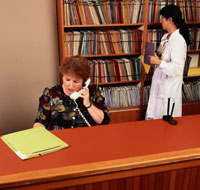Dilemma - Staff as patients
Post date: 04/06/2014 | Time to read article: 3 minsThe information within this article was correct at the time of publishing. Last updated 18/05/2020
It has come to the attention of our practice that a long-standing member of our reception staff team is registered as a patient at our practice. We had a management meeting about this and the partners feel uncomfortable about the arrangement. Please can you advise on how we should manage this situation – should we remove her from the practice list?
Practice Manager, Huntington
Medicolegal advice
 By Dr Marika Davies, MPS Medicolegal Adviser
By Dr Marika Davies, MPS Medicolegal Adviser
Providing care to anyone you know can be problematic. The GMC recognises this in its guidance Good Medical Practice, which states that you should avoid providing medical care to anyone with whom you have a close personal relationship. Even if GPs and members of staff do not consider themselves to have a ‘close personal relationship’, in general, it is considered best practice for members of staff to register as patients at different practices to the one in which they work. It is in the best interests of all patients to have access to independent and objective medical care.
Withholding information
Difficulties will likely arise when providing care to patients who are also members of staff. For example, the patient may not disclose information that is crucial to a diagnosis or management of a condition because they are embarrassed to share that information with someone with whom they have a working relationship. Likewise, doctors may fail to ask sensitive questions or carry out intimate examinations, which ultimately is not in the best interests of the patient.
"The fact that their medical records are kept at their place of work introduces a risk that a colleague will accidentally or purposefully access confidential information that is held about them"
Informal chats
There is a risk that staff will consider that an ‘informal’ chat with their GP about a medical issue counts as having consulted their GP. However, the GP may not have explored their concerns as fully as they would have if they had had a formal consultation and it is unlikely that they would have conducted an examination or documented the relevant information in the medical records.
Another element is that all patients are entitled to confidential medical care. The fact that their medical records are kept at their place of work introduces a risk that a colleague will accidentally or purposefully access confidential information that is held about them.
Employment issues
A patient whose doctor is also their employer may feel unable to refuse treatment, question a decision or seek a second opinion. If a member of staff requests a sick certificate, the doctor will be aware of the effect their absence will have on the smooth running of the practice and the pressure on other colleagues, which may impact on their ability to be entirely objective. It may be particularly difficult if the cause of the absence from work is stress in the workplace.
Managing the situation
The simplest solution is for staff to be registered somewhere other than where they are also employed, but the situation needs to be handled sensitively. Often patients will have been members of a practice for many years and will be very resistant to the suggestion they should register elsewhere.
Explaining the reasons for your request carefully and helping them to understand why it is in their best interests not to be a patient of the practice is important. Provide them with information about other practices or GPs in the local area, and consider having a reciprocal agreement with another practice.
"The simplest solution is for staff to be registered somewhere other than where they are also employed, but the situation needs to be handled sensitively"
A decision to remove a patient from your list would be a last resort, and should only be considered if there is an irretrievable breakdown in the doctor-patient relationship. Given you will clearly wish to maintain a good working relationship with the member of staff it is unlikely to reach this stage, and the partners will need to come to an agreement about how best to handle each individual case.
Contact MPS to discuss any concerns and consider putting a practice policy in place to address the issue moving forward.


